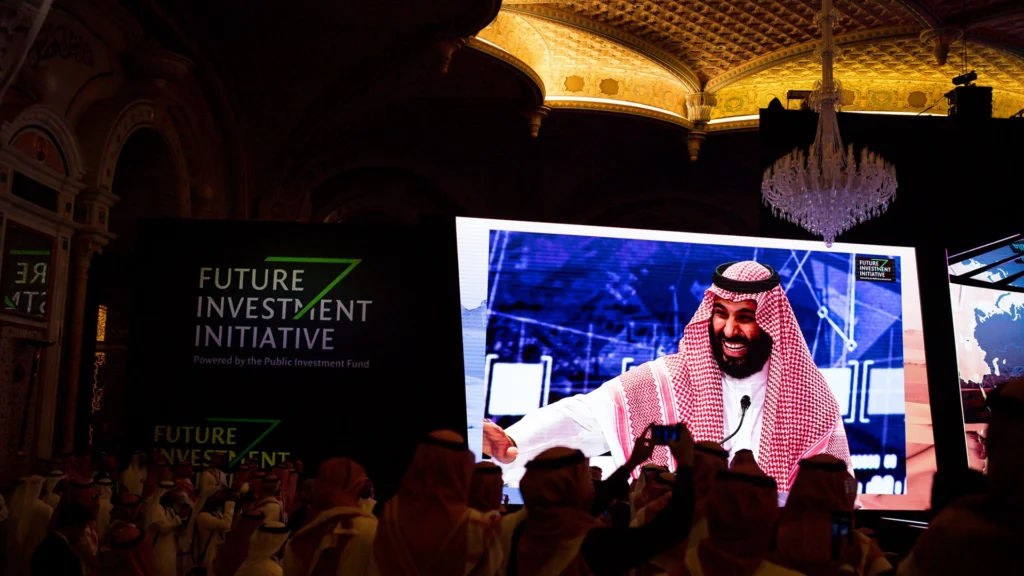Saudi Arabia’s Future Investment Initiative (FII9) in Riyadh convened a who’s‑who of global finance, with Goldman Sachs (David Solomon), JPMorgan Chase (Jamie Dimon) and BlackRock (Larry Fink) taking the stage alongside Gulf power brokers to map the next phase of capital flows.
The gathering comes as the kingdom signals a strategic pivot: Riyadh is preparing to refocus its $925 billion Public Investment Fund (PIF) away from slow‑moving real‑estate gigaprojects and toward faster‑return sectors such as logistics, mining, AI and industrials, according to Reuters reporting from the conference.
The event (often dubbed “Davos in the Desert”) ran October 27–30, 2025, and drew thousands of investors and policymakers under the theme of unlocking new growth frontiers.
Highlights
- Wall Street in Riyadh: Jamie Dimon, Larry Fink, David Solomon and peers headlined FII9 panels on geoeconomics, capital flows and AI‑driven growth.).
- PIF strategy pivot: Reuters reports the $925B PIF will tilt investment away from mega real‑estate projects toward assets with quicker paybacks.
- US still magnet for capital: Executives said the US would continue to dominate global investment flows in the near term.
- AI, power and tokenization: CEOs spotlighted AI’s capital needs, power grid constraints, and asset tokenization as the next big finance rails.
- Next PIF roadmap: PIF signaled its 2026–2030 strategy is imminent, offering fresh guidance to partners and allocators.
Why Riyadh Matters Now
The FII platform has matured from set-piece speeches into a deal-sourcing engine for energy, infrastructure, and AI-heavy compute. With gigaproject timelines stretching, Riyadh is making room for private capital and quicker‑cycle returns, a move meant to sustain growth while flagship projects like NEOM recalibrate.
For investors, the signal is clear: look for mid-cap industrials, logistics platforms, and power‑adjacent infrastructure that can scale sooner.
What CEOs Actually Said
- Larry Fink (BlackRock): Framed the GCC as a “dynamic destination for global capital,” citing unprecedented appetite for Saudi infrastructure and innovation. He also urged focus on tokenization and payments digitization, not just AI hype.
- Jamie Dimon (JPMorgan): Continued his pragmatic bullishness on the US economy and highlighted the strategic importance of energy security and supply‑chain resilience.
- David Solomon (Goldman Sachs): Emphasized that “showing up matters,” outlining plans to expand Goldman’s footprint in the kingdom and build local wealth‑management capabilities.
Policy Backdrop: PIF’s Pivot and Private Capital
Saudi ministers used the forum to press for a bigger private‑sector role, encouraging PIF to ease crowd‑out domestically and make space for outside investors. In parallel, PIF’s upcoming 2026–2030 strategy is expected to rebalance away from real estate, with more emphasis on logistics, mining, AI, and industrial value chains that accelerate jobs and exports.
Industry Insights: Where the Money Likely Goes Next
- AI and energy twins: Leaders warned that AI infrastructure is straining power grids, creating investable demand for generation, transmission, and liquid‑cooling supply chains.
- Private credit in the GCC: With rates elevated and banks selective, private credit is positioned to finance mid-cycle projects and acquisitions—an area US houses are quietly staffing up for in Riyadh.
- Tokenization rails: Expect pilots in securitized real‑assets (infrastructure, utilities) where digitization can compress settlement and widen foreign participation.
Risks to Underwrite
- Execution risk: Gigaproject trims and timeline resets are real; look for phased deliverables and off‑take visibility.
- Oil and geopolitics: Budget flexibility still tracks oil prices and regional stability; shocks can tighten fiscal space.
- Policy consistency: The pivot to private capital needs clear PPP frameworks, permits, and local‑content rules that don’t deter international sponsors.


